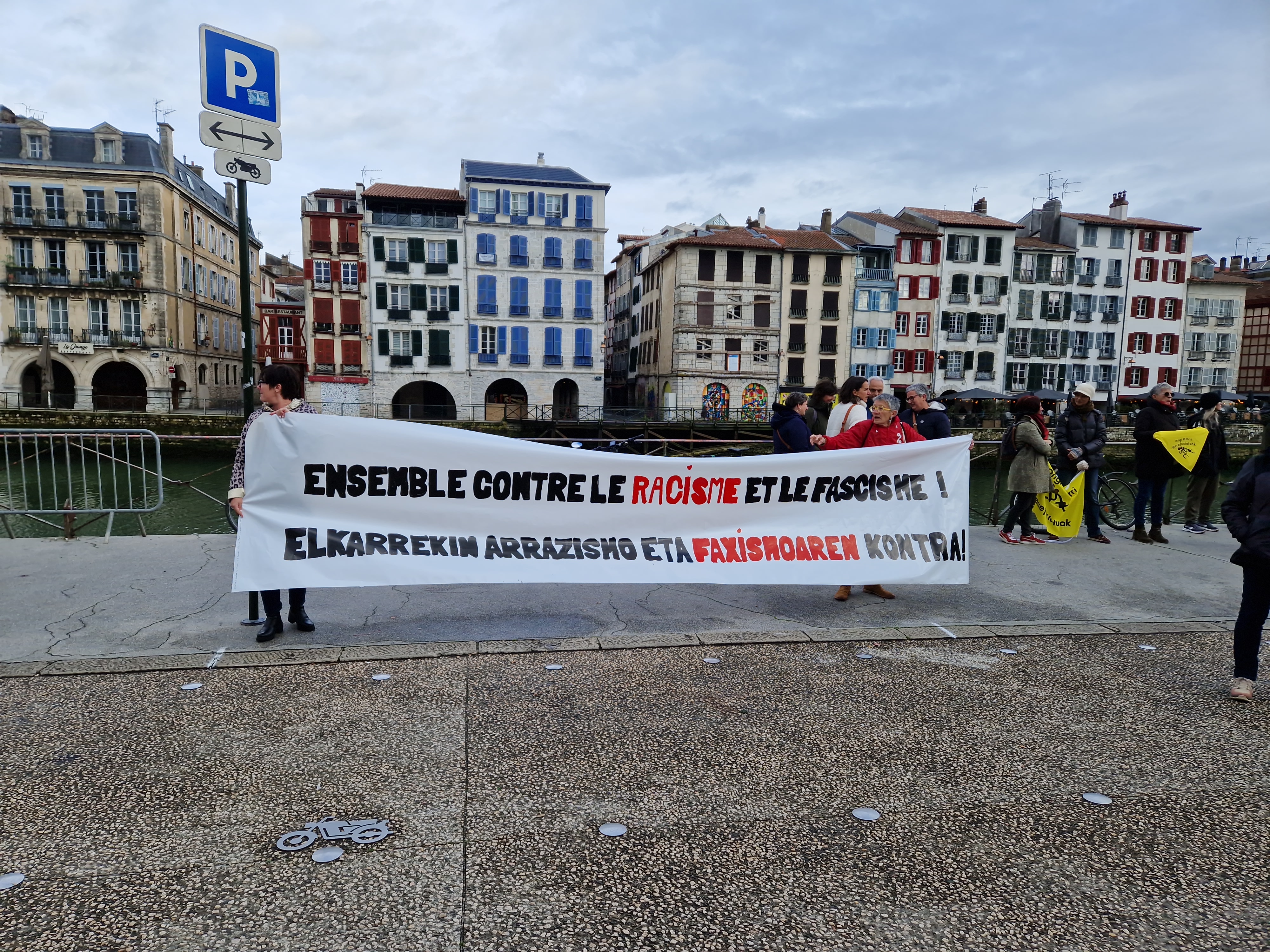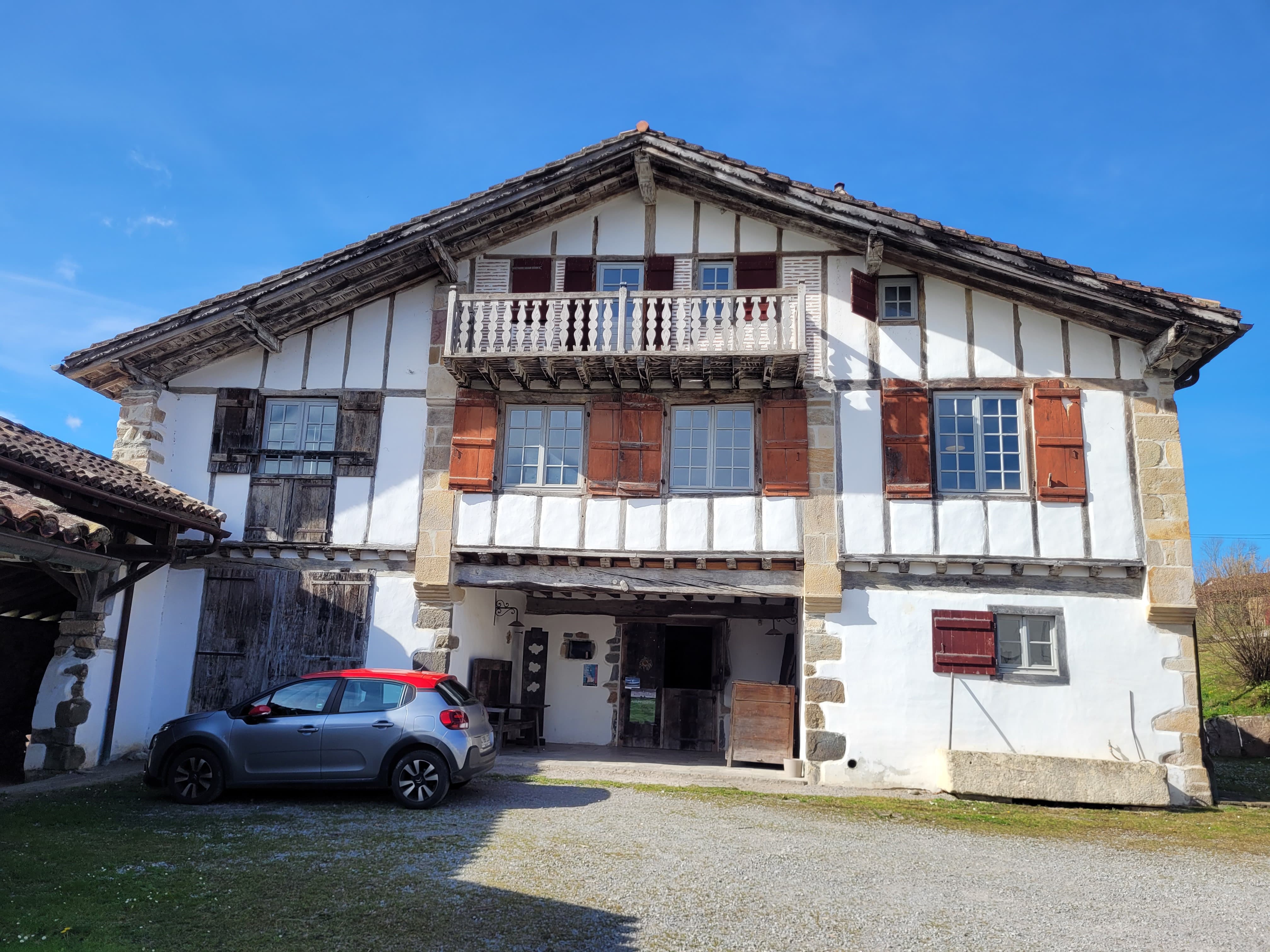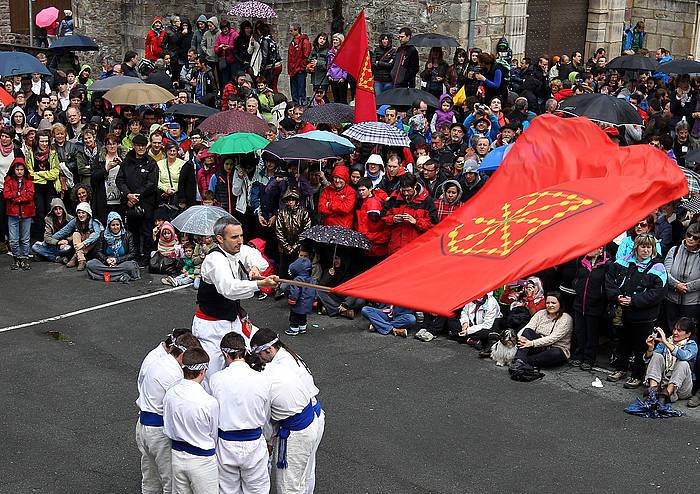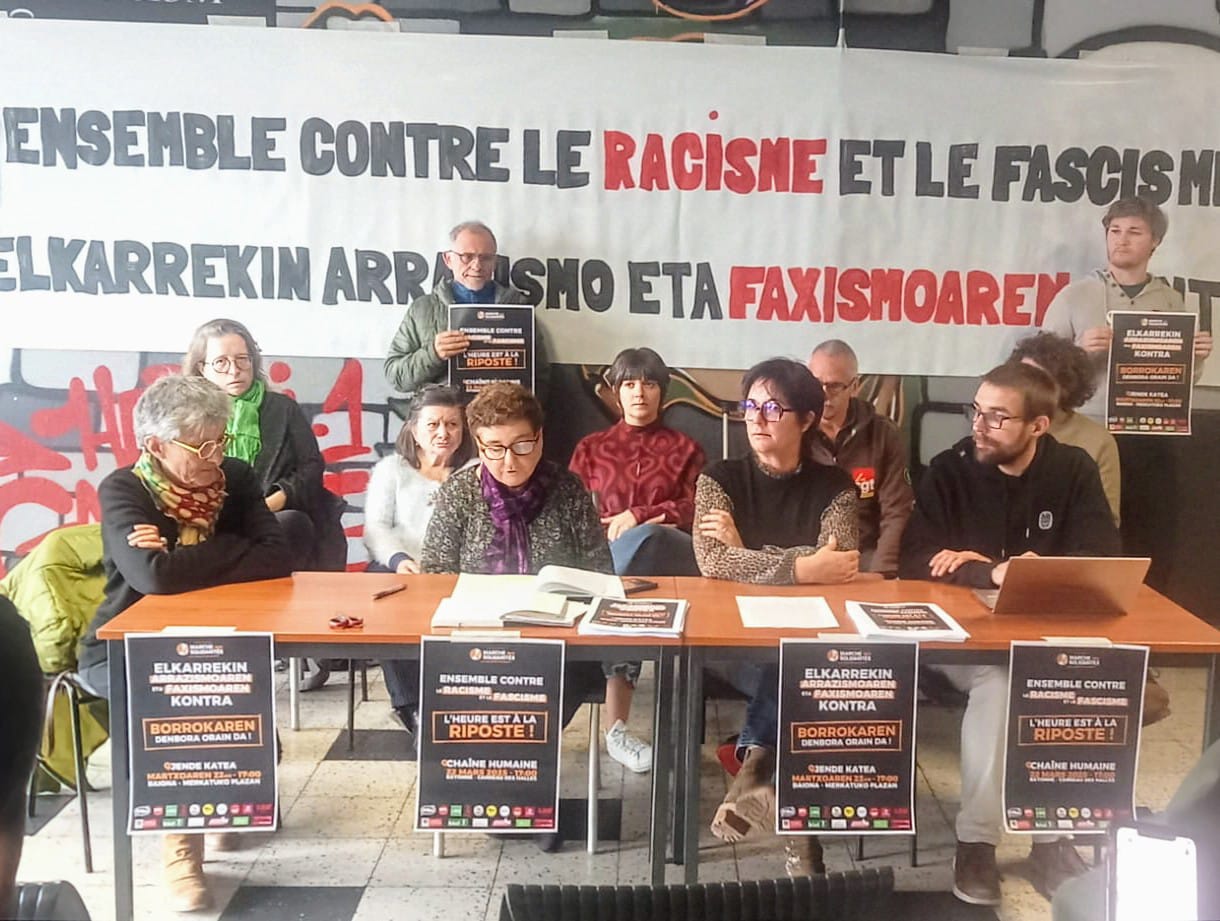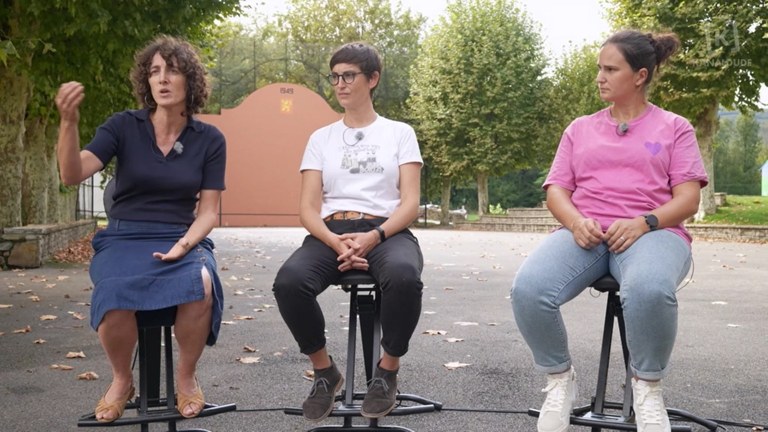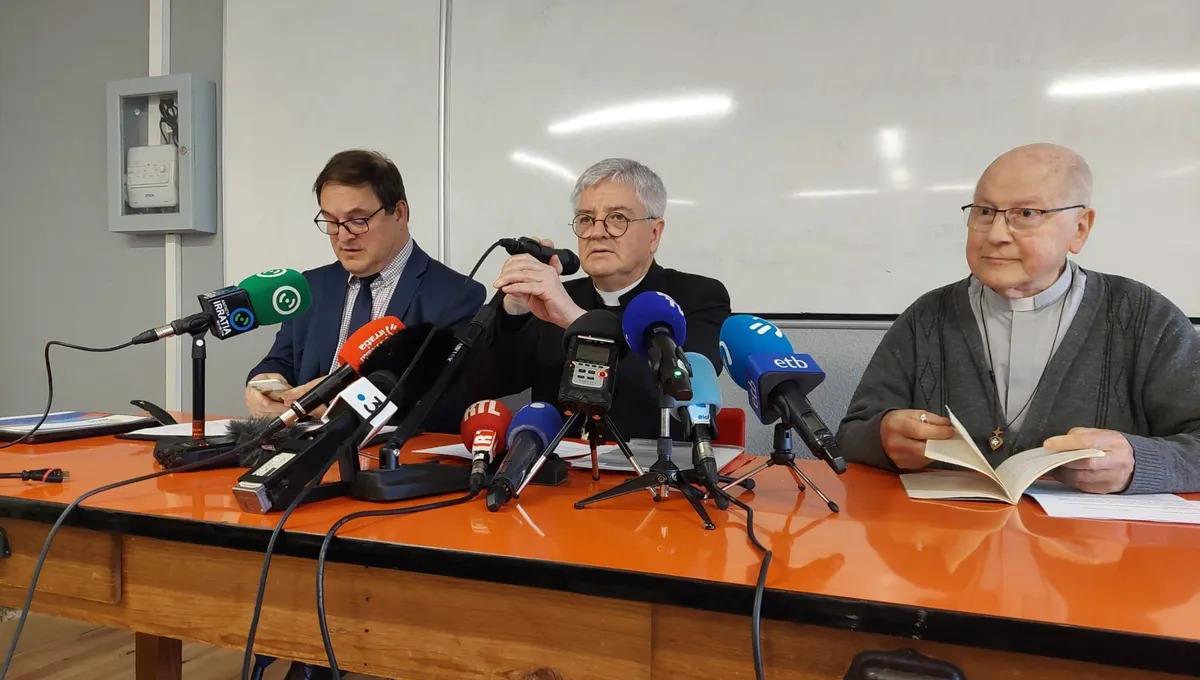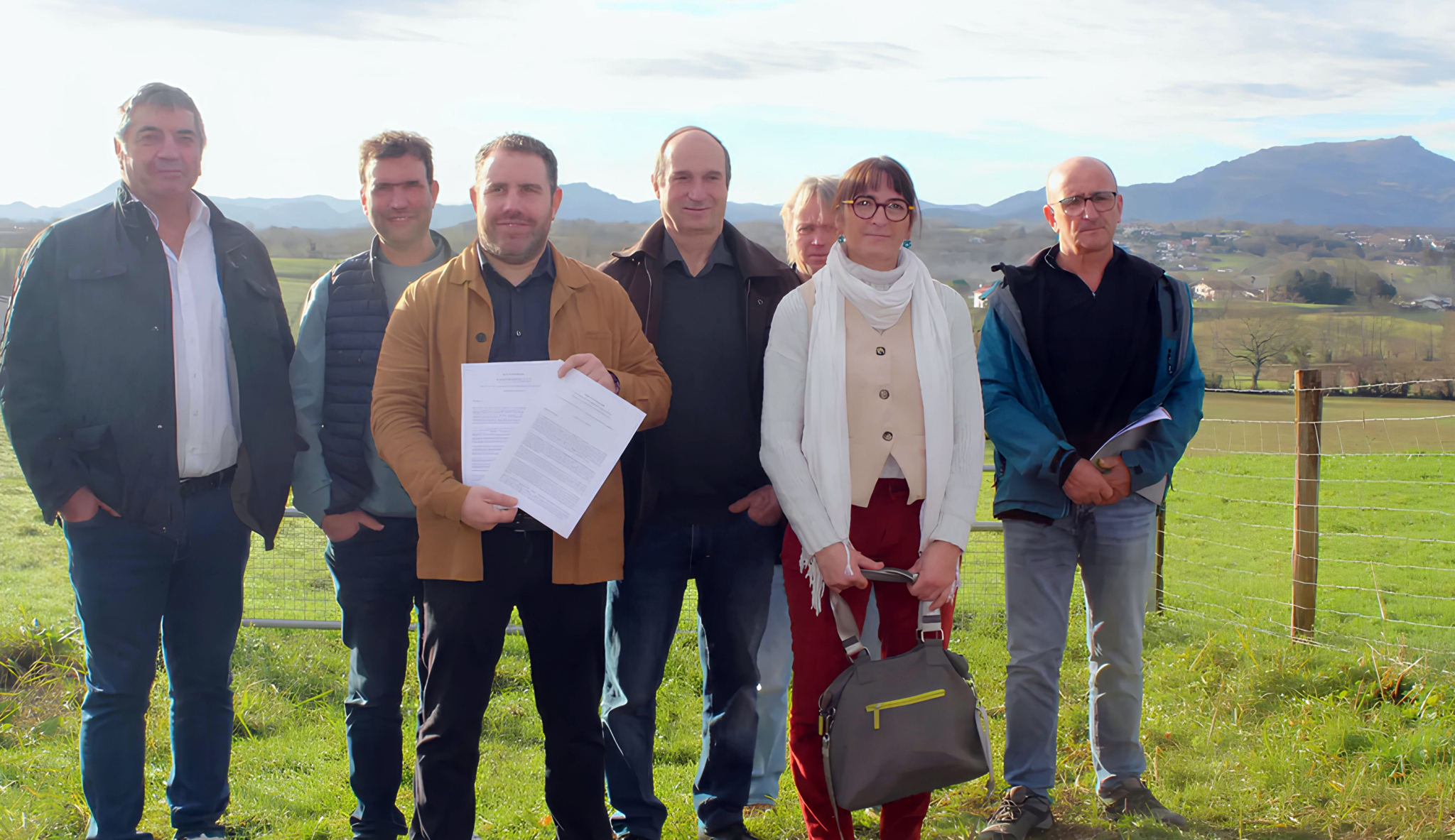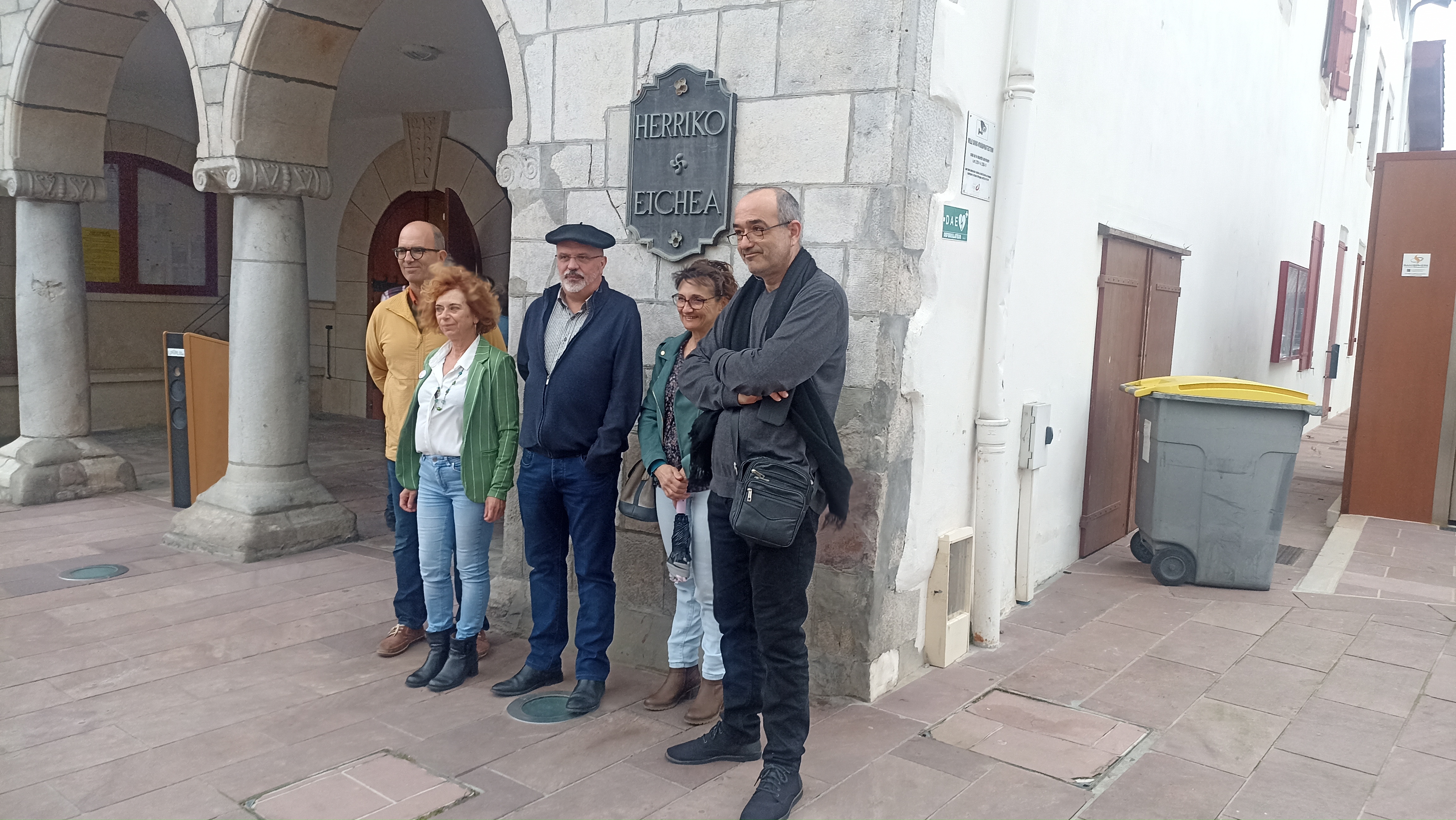Hermanos Bidart: The history of a house, the awareness of a people
- The right-handed Emile Larrea are of the verses we put to Baigorri, sung by Erramun Martikorena: “The village of Baigorri is far from the slopes / They are all scarves, faces and cuddles / But, what matters, create me there / And I want to save myself from the other… Watching Germieta Belex Larla / They say: ‘We have Oilandoi our pearl’ / Arrano is waiting for everyone Iparla / Hunen gerizan borda eta etxola...” And, precisely, the house of Betti Bidart (Baigorri, 1954) is the place where we have met the beautiful mountain of Oilandoi. Next to Bettire are Filipe (Baigorri, 1953) and Jojo (Baigorri, 1956). Young, sick, youngest, Babi dies. And, except for Jojo, “the most sincere, or the most skillful!”, as Filip once said, the rest was imprisoned, even at the same time. So the judge once told Filiper: “I think we have to drag your father!”

Father of the Bidart, Jean Batiste, Kuxkurrio, who marked the first stone of the road traveled by his children, interviewed in 1991 by journalist Mikel Asurmendi in this same ARGIA: “[Jean Batiste Bidart] He was a carpenter by profession, from the age of 14 he learned from his father until he retired. He began studying Basque dances at the age of 16 and in 1966 reunited the group of dances Arrola de Baigorri. For many years, the outside dance teacher made them travel to Baigorri and took the local youth to Hego Euskal Herria to learn dances and act in the performances. For about ten years he promoted the life of the group of dances Arriola and at that time he participated in the meetings of the Basque Country Dantzarien Biltzarra. Currently, their descendants maintain the continuity of the popular group of dances”. And as a complement to them, the following: “The father of the Bidart, a prestigious person in Baigorri. Great vasophile, giristino, bad sprinkler, famous singer, founder of the dance group of Baigorri, widowed in the morning, father of four children. For a moment, I had three prisoners. Hard man, never pleini. Although he did not agree with guns, he was always in favor of his children in public. President of the Northern Prisoners ' Family Association. For 20 years he traveled to the last end of France, every week, alone, to visit Philip. On French television their walks also appeared.”
In these words we have realized that there are no errors when we start talking to Felipe, Betti and Jojo Bidart: dance, music, Euskera… It is a reflection of the way they made from youth to politics, putting in parentheses and lines the armed struggle of Iparretarrak.
Because it is a timid step from culture to politics, as Felipe Bidart will tell us...
Each of you has travelled your way, you have shared some experiences and experiences, but not all. However, all three share their commitment to the people in one way or another. Where does that commitment come from?
Jojo: From the Ttip. I first lived in the dance group Arrola the first interference, or the leg meteor, in culture. Speak in Basque with his father and, with his father’s hand, enter the dance group Arrola. And with them, listen to my brother whistle at home, because at first we hear him at home. These have been the first steps.
Philip: My father ran the Arrola group, he turned it on again, and we went on and started dancing from the ttipi. We talked at home in Euskera, and we've had it through my father, and accession has come to us on Euskera and Basque culture. Dance, music, txistu, group of local singers... In Baigorri, the group of singers sang in the Church, but in the moves [ritual for the newlyweds to enter their house] and in others in Baigorri. This group of singers was led by Pello Erramuzpe.
Betti: And I, like, saborated that source that my brothers have said. As a young boy, when I was a kid, in six or seven years I wanted music a lot. And when I heard the Txistu, I wanted to associate it with it and I started, and then I stayed in the dancers' group. On the other hand, I had a jacket to learn music with a friend of my father. I would come once a week to Baigorri and teach me music at home in exchange for food. I was in many groups of dancers here, from our brains, and I also studied in the conservatory. So I had a cane to go out and dance with other groups. I also participated in the first steps of the Arrola group, and so I started my relations with the South, first in Navarre and then throughout the Basque Country. We walked many and met many people. It was in the early 1970s. Everything was then related to culture, politics and life in the people.
.jpg)
Is the mother's image good? My father’s Euskaltzale, dance, txistu… and mother Kati?
Jojo: It is the father who has passed accession to the Basque country. Affectivity is the mother. We had a very close, personal relationship, not so much linked to Basque culture. Or yes. I can't think of anything else in Baigorri, without my mother's meals. That has a lot to do with us, but also with a lot of people who have been through our house. In relationships with people, the mother has a big part because she welcomes them home.
Betti: To give you an example, at village parties we always did the food. Family and friends, we gathered between 30 and 40 people. I remember once, I had a friend of Uztaritz, Txistulari. Tuesday was late, because it is not Sunday! That friend told me. “Do you know how many people have spent the afternoon of your house?” And I: “No idea!” And he: “For it means to go through your house and take something, to be coffee, desert or bread and gas… eighty-five! I've all counted!" He was surprised! Then we were playing the txistu and relaxing the party and playing music all night long. At the refined party, we walked from the square to our house, and we got ruined, and my father got up and started making the egg omelet. And my friend, again surprised: “Hey, in our house you don’t!” In our house there was that opening. And for those engaged in music, singing and dancing, the violent ones were always open.
I have also heard you that your mother will wear costumes for dancers [Philip]...
Philip: Yes, he worked a lot on that, along with others. In my memories, it was a very special step that we took in the early 1970s. The father took care of it, and the clothes were stitched by our mothers, and I went distributing the garments in all the houses, because at that time all the houses participated in the ride, from each house there was someone who participated in the ride, and it was sold in a mold: soft pants, red tape, flyers... All peoples participated in the horseback riding. They were assembled in the form of hoppers – riding and hoppers, both united – and the people remembered the old horseback riding, which was the day after the Second War, in 1946! It was also remembered who participated in that horseback riding in each house and everyone wanted to participate again. People from all generations, young and old, met and this has given me testimony to customs, dances, mutxics and their attachment. There the heart of the people and the community was truly healed. Hence, I have entered the world of politics, because culture is a small step towards politics. Through culture, language, relations with citizenship, there's been an awareness within me.
May a ride produce such miracles.
Philip: That has been the case. It's been the horseback riding first, and then we've created the plugs, but otherwise, politicians, social problems. We made fresh nozzles, and that's where tremendous steps have also been taken, linking culture and politics. However, as we renewed the hoppers, people did not take the same benefits. Some, who were new, that the issue was also political… There were incidents and little breaks! So, to reunite and reconcile citizenship, we set up other hoppers two or three years later, but at that time they were the typical toberas. We entered that game, which was more than a game, to reconnect with citizens and reengage, and we got it through the classical nozzle.
Similarly, the appearance of Navarra Day in Baigorri was sufficient. People did not accept…
Betti: The first Navarra Day took place in 1979. That day he turned on the relationships we had then. We mostly went to Navarra, dancing, and invented the day Baigorri de Errate and Nafarroa Beherea, part of Navarra. It was a cultural activity, but there was also a general message, both around the Basque country and in favour of the unification of Navarra. Obviously, this message was not seen with good eyes by the politicians here, the new thing was that the fault was a Navarra, wanting to join. “To listen, these young people are someone...” There was movement here, and all over the North! When the first cultural groups were set up, in 1977 or 1978, the young people who organized themselves by towns throughout Iparralde, the movement was quite rapid: Popular groups [groups formed between 1975-1980 in villages of the Northern Basque Country].
I remember there was a rally in 1977, in the [Baigorri] ratchet, denouncing the situation here and making proposals about the work, with cultural and social demands. We were all citizens. We prepared this meeting among the young people here around a reflection. And the movement followed, and it was decided that a cultural week had to be organized, because at that time they began to make cultural weeks in Zuberoa, Hendaia, Hazparn, Donibane Garazi… Here, in the first cultural week, we plan to do Navarra Day. If we had relationships – made through dance – in La Ribera, in Pamplona, in Estella… and we brought local dantzaris groups, the first Day of Navarra was organised. The response was very quick.
Jojo: That was the spirit of the People’s Groups, and more than the spirit, to cast the mould: to bring citizens together, to bring young people together and to realize the situation. That was the starting point above all. Then you'll see what to do. But then it was the citizens themselves who took the floor.
.jpg)
You realized the situation, Jojo. What do you think the situation was?
Jojo: When the people were dying, that was our feeling. But it was more than feeling. In particular, we did a study and participated with other young people, I remember very much Peio Iralur, who was with us. Data was collected from people to people. It wasn't a time of data collection on the Internet, and we passed through all the villages in the cantonment of Baigorri, and we realized that, with the data collected, the cantonment of Baigorri and Atharre were about to die. In the foresight we realized that we were about to die, that we were drowning. And that was unbearable.
The Basque country still lived at that time, but we saw the problems that could come. And economically, because the young people left here, do something to live! However, there were movements. He had started a project to set up a cooperative in La Rosa, and the state banned it! The aggressions already existed in different departments: economy, culture, social level… and the young met regularly. I have a very positive and very rapid memory of that time: I was seventeen and eighteen years participating in those meetings. And we realized that to get out of that octopus, we had to do it ourselves.
Betti: However, until then the people were in the hands of the lords, it was not like now. There were still some lords – Intxauspe, Duboscq, Grenet… – who had enormous strength and power in the people. Everything was in their power, both the press and money… All people went to them to get something out. They were typical gods, unmistakable in people's spirits. And when we went against, "Not political, not political!" they said. Politics was dirty, it shouldn't be emotional! For people that was terrible. “Culture is good, but don’t make politics!”
Philip: Since the Group of the European People's Party has been mentioned, this meeting of our people brought together most of the youth of the cantonment, of the region, of the valley. A pickle was signed. The situation was denounced and demands were made from the valley itself. A group of 250 young people signed that thumbnail to show that there was a sense of awareness and that it was creating a movement. I know that in the prefecture they were a little surprised and raised the alarm: “For example, here you are riding something, you have to take these demands into account!” They didn't listen at all!
Culture, yes, not politics. In his house was also culture, the father’s language, dance, music… Was there political consciousness, political patriotism?
Philip: The father was Basque at the root, he felt Basque, but he had no political conscience. Politics lacked commitment. As Betetik says, her father also had that thought, which you didn't have to do politics. “Politics is dirty, you don’t have to get into it. If it’s controversy, calaphytes are produced, and it’s not good to turn on or raise the calaphytes,” he said. Xalbador also sings that in his verses. At that time, those who appeared here as nationalists were from Enbata, and most of the Enbata did not know or Euskera. There was a rupture.
We become aware of Basque and Vascophilous and naturally become politically aware and commit ourselves politically. We immediately felt this need, because it was not enough to appear as a Basque and not to take political steps, because political decisions and measures had to be taken, and that was only possible by political means. It was necessary to arrogate society and take those lords from their followers. The first step for the young people of our generation was to participate in public political sessions, postpone questions and make observations.
.jpg)
“We have touched through our father and we have come to join the Basque Country and the Basque
culture” JOJO BIDART
Betti: What was very important was what in 1981 was called country contracts. Through them, the French State came to the peoples with subsidies to take them to new projects. That was in the hands of the lords, the money they distributed. The dove said: “There are going to be commissioners, we will help this and that...” But one year, we young people organize and enter all the commissioners.
I remember, I was a young boy, when I was 20, I went to a meeting of officers. There were about 70 officers and Guermite was the General Counsel and there were Members. There was power there. He starts explaining Guermite’s contract, saying that there was a decision to do. There I was, including the coconut. Take the floor and: “Forgive, but you will have to do commissions, yes, and sessions, weigh and analyze what we want to go…”. And he: “No, no, here we will!” And people look eni. And I: “But contracts don’t usually go that way, you have to complete some stages.” “What do you know? He started before everyone. And I: “I have here texts ...”, “Where are those texts from?” “They are public, they have come from the prefetura… They are official texts…”. He started scanning between people, what to do, what not to do, the man didn't know what and how to get out of there, and it was decided that he was going to set up a commission, who was going to go to the commission, and then he was going to make another big meeting between them all. The Alimal scandal started and it happened in every village. A dynamic emerged around those territorial contracts, and as a consequence of the holding of the general assembly at Donibane Garazi's consistory house, we presented our proposals.
In the previous village meetings there was always someone who made it clear, some guide, who in any case took the first word…
Betti: There were people, Mizel Bergouignan and many others, with political conscience and training. Nothing, take from home and so on! That's where I started a little work, that's where I learned, and then we moved on, that was my case. There was movement there and here, but we have taken the first political step in the people, within the Baigorri Group and the People's Group.
Philip: That was the beginning of the Popular Groups. At first they were local groups, local militants, usually young. We met and talked about the situation. As Jojo says, the people were dying, and we had to do something, but we didn't know what to do, where to start, what to ask, what to build... Perhaps this way of doing came around the whole movement in France in the previous years, in the state of 68. This spirit of narration and militantism affected here in the early 1970s. Otherwise, it's not me that we had to do. That was not the case.
The Church prevailed at that time and, with the Church, its beliefs, its duty to be sincere and obedient.
Jojo: There was that among us here, but at the same time we have to realize that the clash occurred in the Church itself, and we have also known it in Iparralde. And I know what I'm doing, because Philip and I have passed church schools and priests' schools. First of all, I left there in 17 years, and at that age there is awareness, and within me there were two movements: the Basque movement and compromise. In this I have lived a very important stage in the lyceum, within the movement called Mendebiri, in which we began to reflect and understand already what we live at home and in the people – through dance and music, and in the Basque atmosphere at home. It is not, therefore, the story of a house, but the awareness of a people.
.jpg)
"Politics was dirty, it shouldn't be emotional! For people that was terrible. “Culture… is fine, but don’t make politics!”
BETTI BIDART
You, however, received that awareness in lyceum.
Jojo: Yes. For the first time, I heard the story of the Basque Country. In the lyceum we had history courses but we never talked about Basque Country. In the Liceo, within the New Century movement, yes. There I learned about history and Euskera. At the same time, there were movements around the refugees, and at the same time we were going with the dance group Arrola to the South and the repression was huge around the ikurrina.
Besides the liceo, it was another, as he has ever said, Jojo…
Jojo: Because he mentioned the Church, it has to be said that there were different movements in the same Church. “You have to accept the thing… You have to accept what those on top say… You have to lower your head, suffer…”, that was all that the Church said, but also in the Church had made it coincide with Liberation Theology. That had another value: Life value, freedom! Personal, but also collective and social value. In seventeen years I did not want to recognize the values that the Church had imposed on us between hours, and at the same time there were Popular Groups, and we got into them. A valuable experience at that time. I am thinking of Ainitz, the experience of the Group of the European People’s Party which we do not address. The whole movement then is: “Let us take our situation in our hands… The Basque will not be saved by others, we will save him.”
Jojo comments on the refugee movement. The first refugees, the historical militants of ETA, come from the South.
Philip: Refugees are not directly related to the Popular Groups, which have emerged in relation to the situation here, to the new generations, to the militants who are becoming aware. We lived in the support and solidarity of refugees naturally, lived in it. We were all involved – because we mean those who could, or those who were wrong – in that support. This entered the general perspective: how if we were aware of Euskal Herria, these were Basque militants, they arrived from the South. In addition, it was the time of Franco, in that fight against fascism and Franco we shared one hundred percent, we were willing to support the struggle and we supported the refugees. This solidarity with refugees and with the South entered our mindset and our fact and involvement.
In your case, in Baigorri, you are at the limit…
Philip: And if we zoom in to the border, we have a relationship with the other side, easier, and we see that Euskal Herria doesn't just stay at the border, and at the border they're also Euskaldunes, we have the Euskera itself. This support for refugees has come naturally. That is also on our militant path, which has also influenced our awareness, but it has not been the promoter of the movement here, or the one that has caused the movement. Refugees have been considered, and have been eating more and more, they have experienced that solidarity and have provided them with great help.
Some of the refugees highlighted: The little [Eustakio Mendizabal], [Juan José] Etxabe… You, those who have brought there to those there and those here, knew them.
Philip: We have had them here, we have supported them, we have taken them by the hand. That they were young at that time! Txomin [Iturbe]. Then they have made their way. They have lived in Baigorri, some of them working, in Deba. The cooperative has been an important thing in the beginning of the struggle, in the awareness. There, too, some refugees entered work.
Betti: They also existed among the founders.
“It was not enough not to take political steps, because political decisions and measures had to be taken, and that was only possible from a political point of view”
FILIPE BIDART
Philip: It cannot be said that by gaining political awareness one element has been more important than another. Like ikastola. They've been created because some parents here have wanted to create a Basque school for their children. First began the ikastola in a house, with a fugitive that was fed from the South [Libe Goñi], and I with him. At first we created a nursery and then came the first level ikastolas, declared schools. The ikastola movement has expanded with the parents here, with the teachers here, with the collaborators here. The Group of the European People’s Party has not created it, but has done so, strengthened it, participated and involved it.
.jpg)
"The situation of the language is maintained, but more needs to be done if Euskera is to live here"
FILIPE BIDART
And what is it when a friend falls? 50 years since the Txiki assassination. They met him and helped him.
Betti:Eta Txapela [Mikel Goikoetxea], eta ainitz!
Philip: It is clear that when a acquaintance is murdered, it is unworthy of us. And that we are moving, there's no question.
Betti: I've often had very good friends. Other less good, but some very good.
In that bego, because Betti has no more than stones… It is not only with culture, decisions and political measures are necessary, and you, as your father said, jumped into a dirty policy: The Popular Groups, the support, the political struggle, the armed struggle and the Iparretarras… “Euskal Herria is not sold”, in the dyes that appeared “The people want to live”.
Betti: Things have changed, in my view. At this time, instruments have been built that have accelerated in 80, structures have been built, and now it seems that these things are normal, old. Today, people enter those structures as if they were integrated into a normal position, not as a militant. A job seems normal to them. Maybe some things, for better. People have learned, they have specialized, they are more professional, but they do not take the militancy of years ago.
Now there are no militants?
Betti: Yes, there are obviously militants who do too, but these instruments have now become normal. And, on the other hand, in the cultural sphere, and in that of things that previously have a great influence on peoples, they now have less strength. There are dance companies that I don't know how many, that have amazing dancers, that make amazing creations, and that's very good for Basque culture. At the singing level, music has gone over rock, rather it realizes what is sung. Before you heard messages, now I don't understand the message, but surely things have improved technically, if now they are better musicians than before, better dancers than before. There are things that have improved on one level, but the atmosphere of that time is not today. It cannot be the same in forty years, but...
“People have learned, they have specialized, they are more professional, but they don’t take the militancy of
years ago.”
Jojo: Regarding the message, today you feel the same things that were sung forty and fifty years ago. And when we listen again, they have the same repercussions, and perhaps in some more eco departments: in the housing problem, in the Basque Country… Fifty years ago we began to realize, we said “Case…!”. Today, despite the fact that there are some things that have improved, but that have made great efforts, we realize that it is not a benefit forever! In Etsenplu, a fight that took place last year and that has been repeated this year: Low in Basque. This shows that this is not a benefit. It will be achieved in one year, but the next year you can lose what you achieved the previous year, right away! All this must be perpetuated and it must be done.
You, Jojo, have worked on the creation of the Irulegi radio, among other things. What conclusion did you draw from this?
Jojo: Because I've known the creation of Irulegi's radio and I've followed very closely the creation of others, I could say that creating is pretty easy. Survival has its value and demands its strength. We have to follow this force, and I think we have to be militants who enter this kind of structure. Some things have been achieved politically, but we do not have fundamental things: we continue to lose homes and land, we continue to make progress… We have managed to maintain the Basque country, but there is
a phenomenon that follows: proportionally the number of Euskaldunes is being stifled in Iparralde. Thanks to the ikastolas and this movement we have rejected the accession of the Basques to the name, but the population in Iparralde is growing, and so the Basques are always dyed proportionally.
.jpg)
Structures have been created, some instruments have been built, as they say… What do you say, Philip?
Philip: I agree with everything my brothers have said. These structures that we have created have to be made live, but I think that is not enough. We enter politics from culture, of course, because culture and politics are united. One of the axes of our struggle was to denounce tourism. We needed another policy and advocated here the need to boost economic development. The struggle allowed us, at that time, not to paralyse, as we wanted, tourism policy, but at least to weaken it and delay it in part.
Partly, not entirely.
Philip: Only in part. But thanks to the struggle, some projects were at least annulled, while others similar were promoted by the citizens, both in the world of cultivation and in the cooperatives and in the ikastolas. However, today in Iparralde the Basque is being lost, for the reasons Jojo said, because there is a great colonization, because every year three or five thousand people enter Euskal Herria and gradually the Basques will be missing. Not all Euskaldunes speak Basque, or all those who have studied Basque do not speak Basque. We see it in Baigorri himself: the new generations, where they are not militants and nationalists, do not speak Basque.
Do you mean Baigorri himself?
Philip: In the valley of Baigorri to Urepel! That is the situation. That there is a need for ikastolas, and that keeps the Basque alive, and also makes the Basque identity live, and the need! There is still a huge dynamic around ikastolas: young parents come in, participate, militate, have opted for it. It is not pessimistic when one has to be pessimistic, I am rather optimistic, the situation is bad, worse than forty years ago, today: the Basque country is being lost … tourism… silly, if we stop the armed struggle, tourism has exploded in some way. Ja, ja, ja…
Ha, ha, ha… stop armed struggle and exploit tourism!
(Irri, all)
Philip: Tourism! Now they do everything they wanted to do. These are tremendous projects, but they are all linked to tourism. You just have to see the coast. Hundreds of thousands of people have arrived on the coast of Paris, surfing… They have this image of Euskal Herria! It's nice, it's sea, it's mountain ...
The Errobi group musicated the words of Daniel Landart: “They have invaded the littoral / yes the old houses / pastors or cottages / ancestors. / And they want to go out, / also steal the mountain, / how do we have to demonize / live from here?”
Philip: You can take all the songs of that time – of Errobi, of Carlos, of Etxamendi and of Larralde… – you can take the documents of that time, and today you see the situation, and it is the same, but it is worse, because now the speculation of housing has been growing, the rents are rising, and the young people have difficulties – and here also in Baigorri – to capture accommodation. The housing problem is far worse than before. The situation of the Basque country has been maintained thanks to the ikastolas, the situation of the language is maintained, but more will have to be done than that if the Basque country is to live here. However, Euskera is being lost. They emit us in a ghetto and soon they'll put us on a reserve like the American Indians. Same.
.jpg)
Given the predominance of tourism on the coast, what is economic development in this interior? Cultivation was most of all here, not long ago.
Betti: There are still farmers here, but we are aware of what has come. Thirty-five years ago there were 125 farms in Baigorri. At present there are 75, while on the farms half of the farmers are over 55 years old and most of them are without succession. Once you empty an apple, the grounds are shared between neighborhoods. There are no new growers. There's a movement, there's some that are being rehearsed, and in the village house itself, there's a job of that, to analyze the situation and to go over the peasants, to get someone who almost agrees on their ranch, but that's really hard here, because in our culture we prefer the empty house, to see someone from outside in our house.
Jojo: If it is a fundamental job, and it is still done. The work being done in Baigorri is being carried out on a widespread basis in Iparralde. And all this work causes the economy linked to cultivation to stabilize, always with a clear policy, and thinking about what to do with the very timid peasants, who are the farmers in Iparralde, at least in comparison with France. Here, through the ELB farmers' union, it has been possible to take into account the needs of the local farmers... This trend is there because of the loss of the treasury, but seeing what has happened in the field of crops in Navarre or in the Autonomous Community, objects have been saved here, as a stinger, but thanks to enormous work, and it is nothing.
Betti: In the interior, or here in Baja Navarra, the most important economy is cultivation, and we see what it means. For the rest, it is tourism!
Philip: Tourism is included in all, if it influences all!
Betti: Here you're buying homes from the outside and you've opened up a lot of wilds, rural houses and so on.
"There is Euskal Telebista, there is also Kanaldude, and it is important that we hold, accompany and follow them, we will disappear from the
other" JOJO BIDART
Has it not, therefore, relieved the feeling of drowning that Jojo expressed 40 years ago?
Philip: Or it's older today. We are increasingly drowned. But I prefer to be optimistic, not too pessimistic. I have hope. Thirty or forty years ago, the situation raised awareness in us. I think that this current situation, which is not going to improve, I think there are going to be serious problems, it is going to be that young people will rise one day, become aware and discover the instruments to be able to live. And they will certainly have to be imprisoned if they want to live as Basques and themselves. They will also have to keep their hands, as we have soiled them... I do not know if we have got nothing dirty! Ja, ja, ja…
Each generation makes its own revolution. If you expect young people to eat, they will create their own tools… Do you hope you’ll see it?
Philip: No, at my age! Ha, ha… But I'm a witness, the peasants do a great job. The creation of special networks to support clean local productions, such as the sale of local productions, has a great dynamic and strength. That is why many farmers live, not thanks to aid, but to the sale of their produce. That has been and still is a great job.
Betti: Great work has been done for years. At the dance level, first of all, dance jumps have spread from Arrola throughout Lower Navarre, thanks to Beñat Galtxetabururi. For their part, the songs are on the most sung side, in the surroundings of Baigorri and Banka. Here he sings, people stick to singing. A year ago we did a night in the Bixentainea room in Basaizea, which was a lot of young people. Every night they sang, they surprised us all. They know it in singing and they're glued. Those young people gave songs of Thomas, or old songs… There is still something! We are fighting a “folklorism”. Folklore was a thing that had to be done for tourists, but then it changed that conception, dance has taken the real place in the culture through the beras. There are also dance schools, there are typical dancers, some from Barkox, others from Atharre… they do very nice things.
On the other hand, a new phenomenon is taking place here: at this time of carnival liberations are carried out in seven and eight localities. Freedom is the theatre in which the vicissitudes of the people are spoken. They're not stubborn, but they're staging what's going on a year in the village, and they're really involved in the dancers, and those who participate in it want to do things right. This year we have slept liberties in Baigorri, in Donibane Garazi, in Amikuze, in Lekorne, in Bidarrai… There is movement about this, and each people wants to leave the mark. That is really positive.
"It is the chance of all peoples, we must fight to live. A struggling people will live"
FILIPE BIDART
“The cure is your last word,” which we are talking about. You, Jojo, have made an important part of your life at Irulegi Radio, and also received in 2007 the ARGIA Radio Award for being a communicator of the Northern Basque Country. In 2022, Uncle Irratia, Irulegi and Xiberoko Botza received the Merit Award...
Jojo: Yes. In remembering the steps taken, it is important to create and maintain Euskal Irratia. In Iparralde, media work is important. The Basque radios have left Zuberoa, Nafarroa Beherea and Lapurdi, such as Herri Taldea. This movement has been very important. This movement lasts 40 years. There are some amazing parios for the future, because that media world is transforming enormously. Today there is not only a television from Paris, we have 27 channels! Yes, there is Euskal Telebista, there is also Kanaldude, and it is important that they hold, help and keep in their hands, because, on the other hand, we are drowned, and being drowned in the media means a lot. If we do not maintain these communication tools, we will disappear.
Philip: It is the chance of all peoples, we must fight to live. A struggling people will live. If it does not fight, it will end, it will choke. We have already said that instruments have been created, that structures have been built, but the risk is that everything will then be borne by the state. Because it is not enough to build, it must be maintained and made available to the public. Things must be done as created by the people’s groups, organised by peoples and citizens, creating and inventing instruments, developing and supporting structures. As Euskal Irratia has created, as ikastolas have been created, assembling the group by peoples, with parents, with citizenship and writing “Let’s go before!” That's how the movement has spread, and that's the solution, working from the base and the place.
Betti: That is how we have been. We've been the pots of all sauces, and we've been dancing, music, singing and then politics. We’ve gone all out…
Philip: And we test ourselves so that what we've done has impact and duration. The future is already there, but it has done so, it is not forever, we must continue!
It's worth fighting ...
Philip: It is not worth it, it is necessary.
Jojo: It is necessary and has consequences.
FATHER AND SON
Jean Batiste Bidart, PADRE

“Most people are in favor of Euskera. To those who, frankly, do not consider it necessary for Euskera. I, for my part, note that Euskera is a good left by our ancestors and that we must look at it. There are many who see it like this. Then, if there are so many foreigners entering and mixing people with them, and the Basque is listening less and less among them. On the other hand, how to turn on television is always something easier for children, and that always refers to Spanish, so if the Basque is being isolated on several occasions, in some places, naski”. ARGIA,
27 January 1991, interview by Mikel Asurmendi to Jean Batiste Bidart.
Felipe Bidart
“The Basque identity has always been cared for at home, but not through political speeches, naturally. We have always been underlined that we had to be proud of our identity, of being Basque, of being people and of honesty we could not break our heads before the foreigners, that speaking of French was no better than us. That motto was not just home, in the village and on the lips of some school teachers we often heard it. Baigorri was of a very Basque environment, but with the arrival of the foreigners they realized the dangers of Basque identity.
Later, leaving Baigorri, he caught me at the Uztaritze seminary in 1968. I was a 15-year-old mucus, but then we started doing congresses, protests and demonstrations. We went to Baiona. That was my first demonstration. For priests, this is a big deal, and we were all driven out, but the revolution was a revolution. In the spirits, in the attitudes, everything changed, “enough, we too have something to err,” proclaimed the people. This change of spirit has had a huge influence on me and would become a militant of Iparralde’s second generation
Abertzale.” ARGIA, September 28, 2014, interview with Subai Colina to Felipe Bidart.
Betti Bidart
He's been a carpenter, following his father's path, until last year he entered portraits. However, it is pleased that there are about twenty people who have continued the work in the Baigorri valley. He's also been a musician and a dancer. He started playing Txistu in childhood and was playing Gaita for 17 years. Among them, he participated in groups of dancers present and absent, and the beginning of Uztaritz's research on gaita started Betti Bidart also to learn Gaita, between the brothers Jabier and Fernando Lakuntza.
It is one of the founders of the Day of Navarra, a cultural week was held in Baigorri, and within it was thought to organize that day to strengthen the relations between the Navarros above the border. The Baigorri Gaiters learned to play music with the Pamplona Gaiters. And that first Day of Navarra the windows of the houses of Baigorri are quite narrow, apart from the young, opposite people. But above prejudice, the Day has advanced. Betti Bidart is a witness.
Jojo Bidart
“...almost 40 years ago, the interior was taking off. We have not yet left, but people who want to live in the village have taken their own hands: CLPB gasna cooperativa, Quintoa pork, origin marks... There are elements of hope in economic and social issues. As for the language, thanks to the ikastolas there has been a dynamic in the recovery of the Basque country. Although the loss continues, there is a reboot in young people. 40 years ago the dynamic has borne fruit: we have emerged from a process of death. But surely! Finally, although politically the demands were further from the present, things have been built: College. It needs a sequence. There are a lot of people who think about what project is needed for Iparralde, who was once just nationalists.”
ARGIA, September 2002.
Seaska Sarean inklusio egoeran dauden 165 ikasleei laguntza bermatzeko hasi dute kanpaina, antolaketa propioa eratuta. Frantziako Hezkuntza Ministerioaren jarrera salatu dute kanpaina aurkezteko prentsaurrekoan, behar bereziak dituzten haurren inklusiorako baliabide... [+]
EAE, Akitania Berria eta Nafarroak osatutako euroeskualdearen batzarra egin dute Iruñean martxoaren 25ean. AHT izan dute topaketaren ondoko agerraldiko aipagai nagusien artean eta Akitania Berriko ardatza Hego Euskal Herriko trenbidearekin lotzeko konpromiso politikoa... [+]
Hirurehun bat pertsona hurbildu ziren jende katea osatzeko Marengo eta Pannecau zubien artean.
Euskalgintzak Senpereko Larraldea etxea faltan botako du. Uda gabe, Bertsularien lagunak, bertan gelditzen den azken elkarteak, lekuz aldatuko du eta etxea hetsiko dute. Euskararen, euskal kulturaren eta arteen ohantzea izan da Larraldea, urte luzetan Andoni Iturrioz mezenasak... [+]
Iruñeko Zaldiko Maldiko Elkartean eta Baigorriko Bixentainean aurkeztu da aurtengo Nafarroaren Eguna, egun berean. Ohi bezala, apirileko azken igandearekin bat egingo da festa Baigorrin, eta horrez gain, apirilean hainbat ekitaldi egingo dira eskualdean.
Arrazismoaren aurkako nazioarteko eguna kari, larunbat honetan 16 alderdi, kolektibo eta elkartek deia luzatu dute, Baionako Marengo eta Pannecau zubien artean giza kate bat osatzeko. Aniztasuna, elkartasuna eta giza eskubideen errespetua aldarrikatzera deitu dute,... [+]
Zuberoako ohiturei buruzko bi liburu ditut gogoan. Batek XX. mendean aritu izan diren 180 dantzari eta soinulari aipatzen ditu. Haien artean, emakumezkorik ez da agertzen. Besteak, pastoralei egiten die errepasoa eta hor emakumeak aipatu aipatzen dira, baina omisio esanguratsuak... [+]
Prentsaurrekoa eskaini dute ostegun honetan Marc Aillet Baionako apezpikuak, elizbarrutiko hezkuntza katolikoko zuzendari Vincent Destaisek eta Betharramgo biktimen entzuteko egiturako partaideetarikoa den Laurent Bacho apaizak. Hitza hartzera zihoazela, momentua moztu die... [+]
Bidarteko gasnategian bahiketa burutu duen gizona, militar ohia zen. Asteazken arratseko 7.30tan Erretegia izeneko gasnategian bertako kudeatzailea bahitu eta poliziaren kontra tiro egin duen gizonak 54 urte zituen.
Ba al dakizue frantses batzuk harritu egiten direla mugaren alde honetan ere euskaldunak bagaudela jakitean? Ba bai, harrigarria bada ere, behin, Donostian, frantses batzuei entzun nien sinetsi ezinik beren buruari galdetzen: “Saint-Sébastien est au Pays... [+]
203 diputatu alde eta hiru aurka agertu dira martxoaren 11 gauean egin bozketan. Higiezinen agentziak haserre agertu dira, eta bi salaketa aurkeztu ditu FAIN Frantziako Higiezinen Federazio Nazionalak Europako Batzordean. Bata, lege-proposamenari esker botere gehiago jasoko... [+]
Larunbatean, martxoaren 8an, Urruñako herriak Daniela Albizu izena ezarri dio herriko etxearen aitzineko plazari, emazte abertzale honen memoria omentzeko.
35 film aurkeztu dira lehiaketara eta zortzi aukeratu dituzte ikusgai egoteko Euskal Herriko 51 udalerritan. Euskarazko lanak egiten dituzten sortzaileak eta haiek ekoitzitako film laburrak ezagutaraztea da helburua. Taupa mugimenduak antolatzen du ekimena.









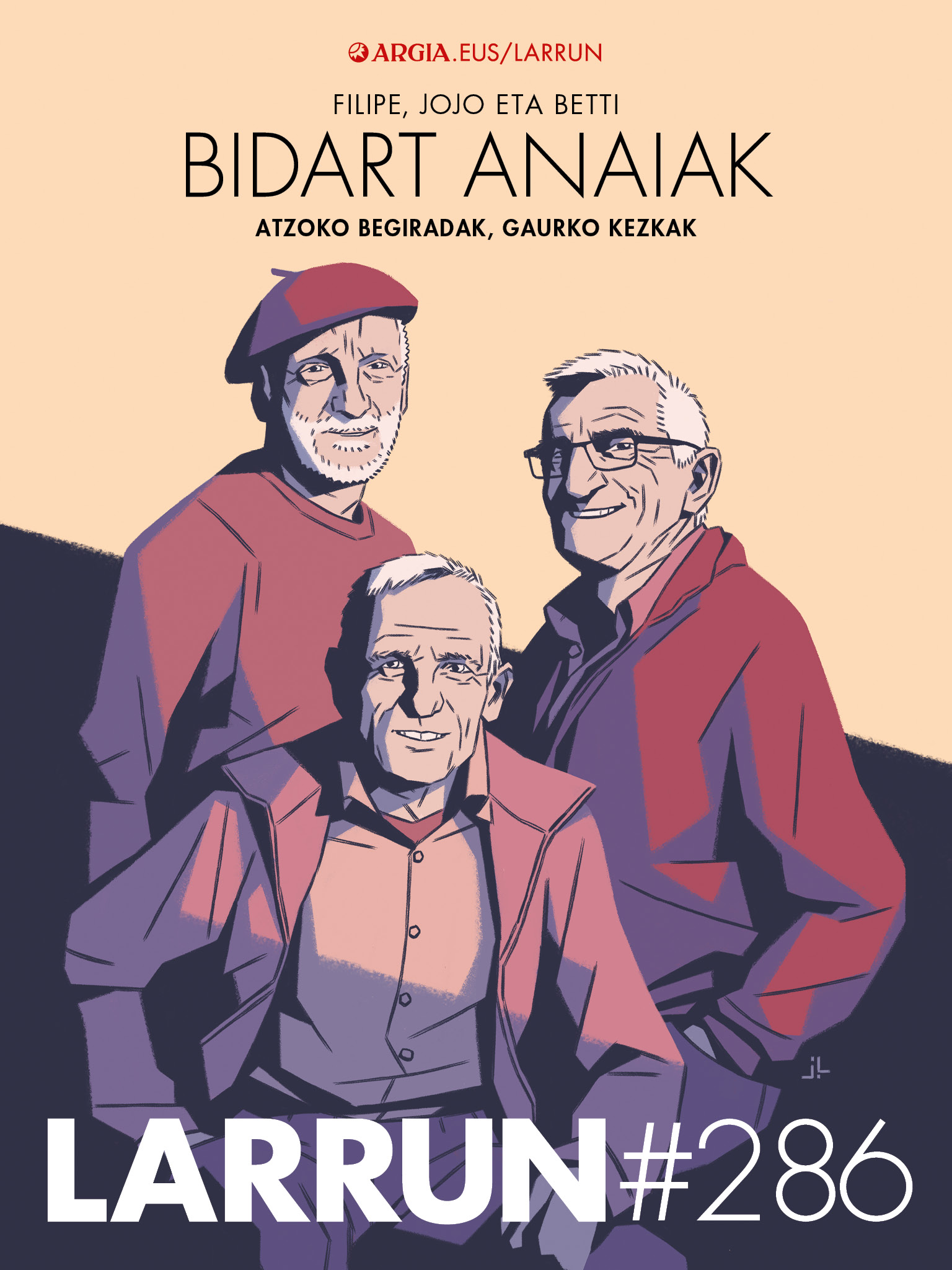

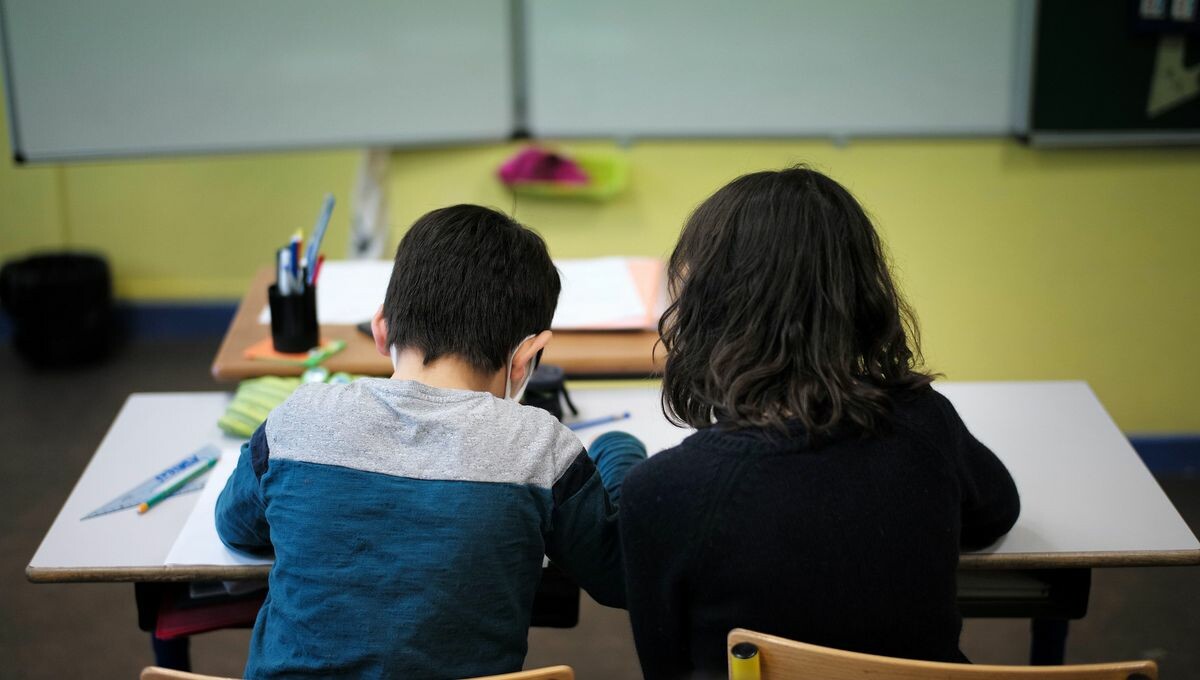
.jpg)
